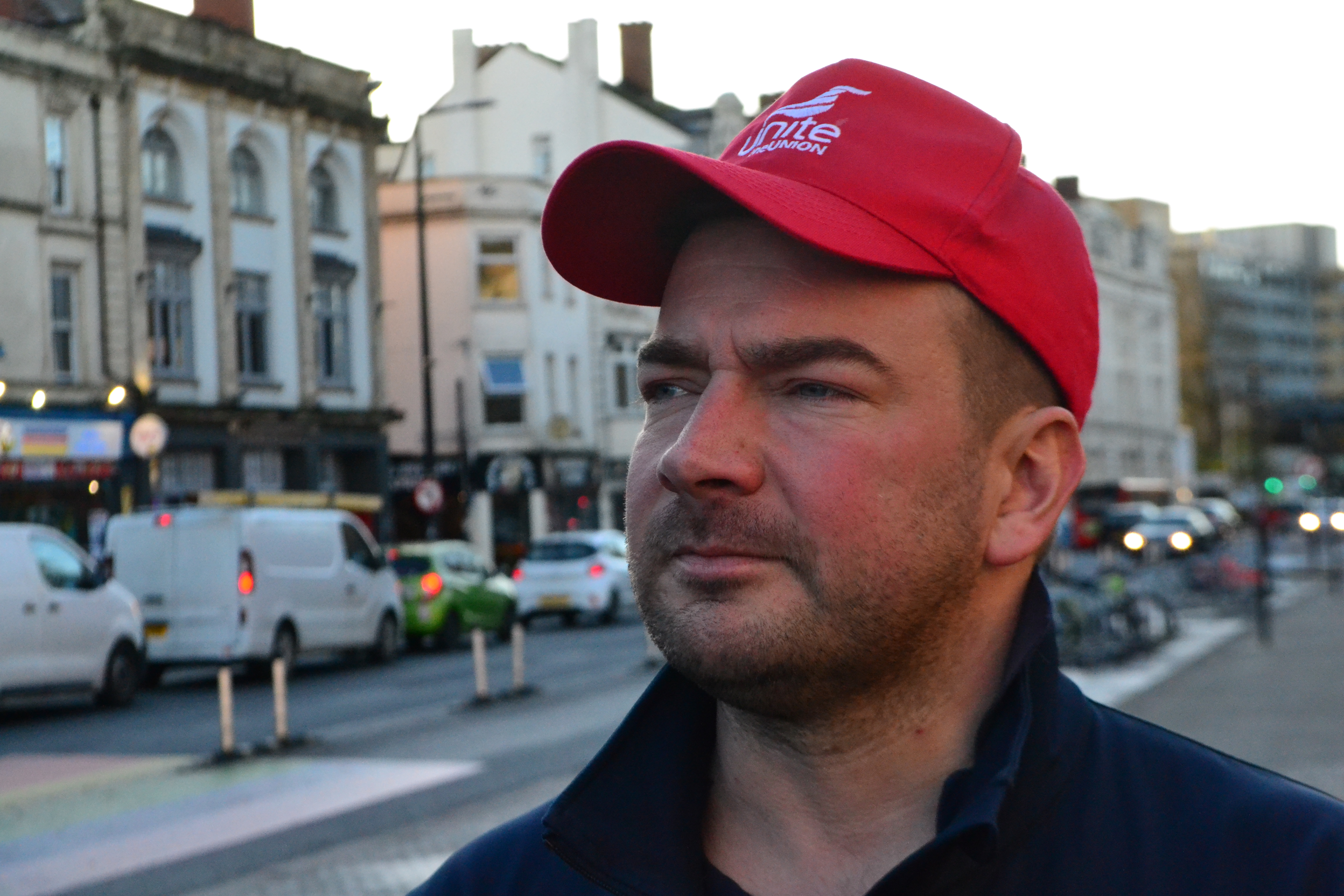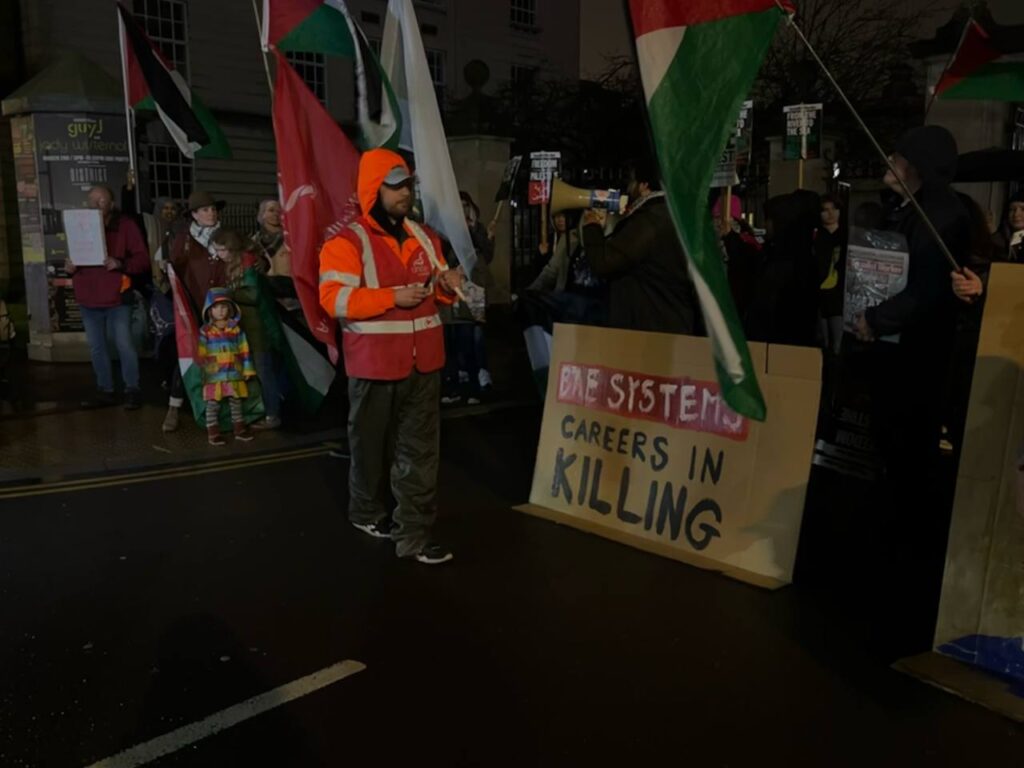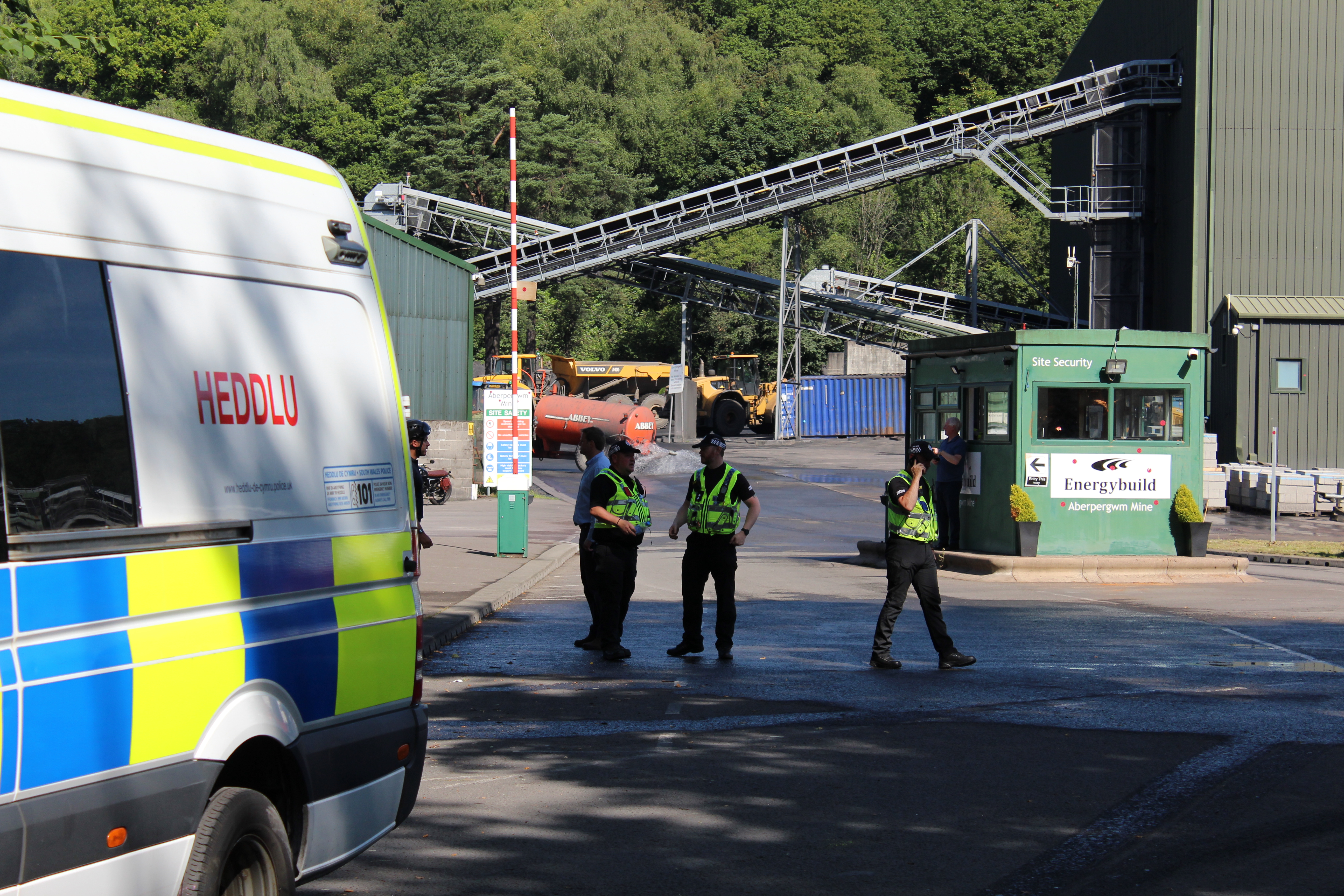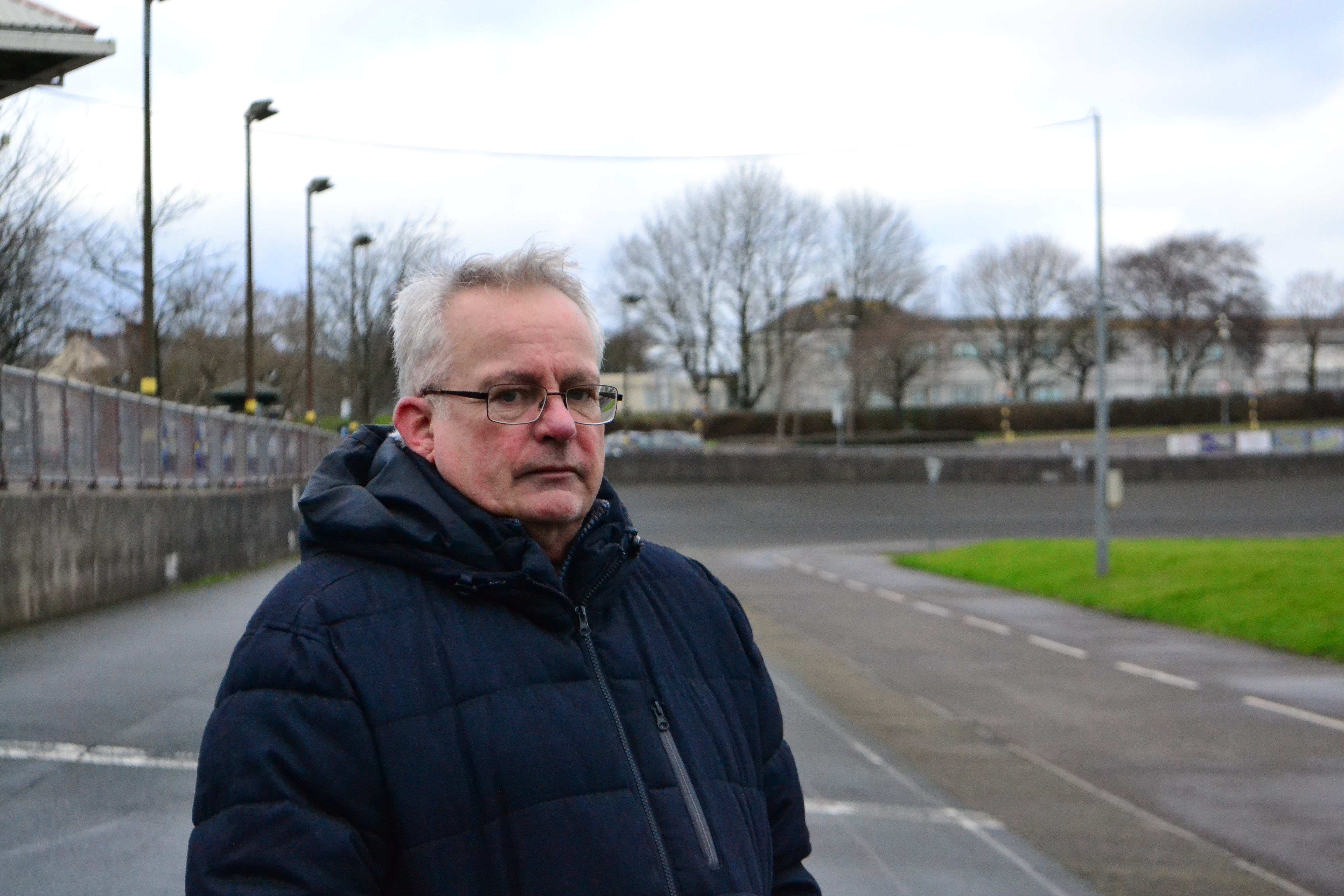
“It’s Weird To Strike And Protest On The Streets That I Clean” – Building Worker Solidarity With Palestine
John Roberts only became a union rep a couple of years ago and first learnt about Palestine from a video clip on Facebook. But since then he’s plunged himself into protests for Gaza and strikes at his local depot. He sat down with Adam Johannes to discuss the meaning of international solidarity and how he ended up keeping night watch at a university encampment.
By Adam Johannes. Cover image: Palestine and trade union activist John Roberts, photo by SC Cook
John Roberts sits across from me in a Cardiff coffee shop, eating a croissant and sipping coffee. His car is parked outside, ready for him to drive home on roads untouched by war. The ordinariness of the scene throws his words into sharp relief. “It’s heartbreaking to see Gaza the way that it is now, in the 21st century, a year into a genocide,” he begins. “I can drive home on roads that haven’t been demolished or bombed or blown up. I know if there’s a road accident, there’s a mechanic I can call. But they can’t. Their workplaces have been decimated. Eighty-five percent of their infrastructure has been destroyed in one year of conflict.”
The Vice-Chair of Unite the Union’s Cardiff Council branch, “Robbo” as his friends know him, struggles to put into words the enormity of what Gaza’s people endure. “In many respects, you can’t compare it to anything since the Second World War. The injustice is staggering. Civilians without basic human rights. Imagine being a trade unionist walking down the street to have your branch meeting with somebody who’s just lost their family the day before. It’s mind-blowing.”
Robbo pauses, visibly uncomfortable. “I try not to get too upset,” he says, though it’s clear the weight of his words is immense. “I have my reps’ meetings with my branch every two weeks. I can choose to have it remotely if I like. But I imagine some poor bugger walking past their destroyed workplace—be it a coffee shop, a garage, a petrol station, a dentist, a doctor’s office. Everything you need to have a functioning society is gone. They’ve lived behind a siege for 17 years, and now they have lost everything”
Since October 7th last year, Robbo has thrown himself into protests, connecting his union work to the broader struggle for justice in Palestine. His words pierce the casual hum of the coffee shop. “Israel’s attacks on Gaza have wiped out over 900 entire families since October 7th, 2023. Every single one of their family members killed. I can call my mother after this interview is done. Their entire bloodlines have been wiped out.” His voice cracks “It’s staggering.”
“We’re complicit if we do nothing,” he says. “It’s that simple.” There’s a quiet fury simmering beneath his words. “Injustice” is a word he returns to often.
Robbo traces his journey toward becoming an activist to a pivotal cultural shift—sparked by a man with a no-nonsense approach to politics. “The ball started rolling that summer Mick Lynch started doing the media rounds,” Robbo tells me, referring to the 2022 strike wave.
“When he was on Piers Morgan, that went viral and started getting people’s attention. It was wonderful to see trade unionists who were real, dealing in facts, dealing in real social issues that were affecting their members in their workplace. They were countering every single argument that was coming towards them from the Conservative Government.”
For Robbo, Lynch’s rise was more than a media spectacle; it was a sign of life after years of dormancy. “Dave Ward of the CWU, Sharon Graham of Unite the Union—I was thinking, why haven’t I seen these union leaders before on camera? It was because unions weren’t willing to take serious industrial action during 12 years of austerity. But two years after the pandemic, wholesale gas prices had obviously started going up, and that triggered everything to go up. Suddenly, it comes alive: we are the people, we live here.”
Robbo sees Britain’s strike wave of 2022 as a watershed moment. “Mick Lynch was like, right, out of the blocks we go. And the Conservatives must have thought it was going to fall flat on its face. “But then CWU started balloting, Unite the Union started balloting, ASLEF train drivers started balloting—and I was like, what the hell is going on? Finally, I am seeing a sleeping giant awake.”
“But then CWU started balloting, Unite the Union started balloting, ASLEF train drivers started balloting—and I was like, what the hell is going on? Finally, I am seeing a sleeping giant awake.”
His own entry into the movement came through contacting a trade union on social media and being asked about becoming a rep at his local depot. “…we haven’t had any reps there for a couple of years now—and I thought, why not?”
From there, Robbo plunged into the thick of activism. “I started getting involved in anti-austerity marches leading up to the Cardiff one where we marched for the libraries, the Museum of Cardiff and St David’s Hall because we thought there was a chance we could save jobs.” The Cardiff People’s Assembly campaign would force the council to U-turn on library cuts, save the Museum of Cardiff, but fail to stop the council handing over the running of St David’s Hall to a private company.
Robbo’s experiences working in the council’s street cleansing team would also politicise him as he saw firsthand the intensification of austerity’s politics of disposability.
“I was working with a great team in the city centre,” He explains. “We made sure the city was safe from a street cleansing perspective—moving broken glasses, needles. The city centre can be a hazardous area early in the morning. We come across a lot of destitution at that time—a lot of drug and alcohol addiction, a lot of rough sleepers. And I’m just walking these streets all of the summer, first thing in the morning, thinking: why don’t we have the capacity to get these individuals off the streets? To get them the hydration they need, the nutritious food they need, and, more importantly, to get them in front of the therapist they need? A lot of these individuals are dealing with trauma from their childhood or early adult life. And they’re no good to us out on the street—they could contribute so much to society.”
When his union got a mandate to take industrial action locally, he didn;t hesitate. “I was like, I’ll get involved,” he says. “I know if I have kids and a mortgage, this pay packet is not going to cover the rent increase or mortgage increase over the last 12 months. There’s no way. You’re going to have to do overtime to pay the bills. This is crazy.”
Robbo took strike action with his colleagues on September 3rd 2023. But a brief holiday in France during the World Cup brought the world’s horrors back into sharp focus. “I went to France on October 5th, and I woke up Saturday, October 7th—it was Wales vs.Georgia—and there were notifications on my phone saying there’s been an escalation in Palestine. I remember driving and thinking, there’s a situation that’s going to unfold now in Gaza that is going to be unimaginable.”
I ask Robbo how he initially became aware of the Palestinian issue, “It was a clip on Facebook, about ten years ago—Abby Martin talking about ‘the illegal occupation of Palestine.’ I had never heard that phrase before. I had no idea what she meant. Illegal? Occupation? I looked at maps, started learning about illegal settlers, land grabs, all of it.”
Robbo’s growing awareness found an outlet when his union invited him to a protest outside Barclays Bank in November 2022. He admits to initial confusion. “I asked, ‘What’s Barclays got to do with Palestine?’ They told me: shares in arms companies, the ones supplying the Israeli military. That was it for me. I showed up.
It happened to coincide with the international day of climate protest”. That connection—between corporate greed, militarism, and environmental destruction—became impossible to ignore.
What Robbo saw a year later only deepened his commitment. “I watched climate protesters march to join the Palestine protest.” Whether it was land being stolen or the planet being destroyed, it all came down to the same machinery of oppression. “The injustice that leads to this suffering is people being denied a voice, not being able to control their own narrative. Palestine. Lebanon. Syria. Yemen. Congo. Sudan. The people of the world have to stand up united and just say Enough! This wheel has to stop turning. This machine has to stop.”

Robbo leads the chants on a pro-Palestine demonstration. Photo by Murthaza Hassan
For Robbo, being in a union is about standing up, fighting back, and connecting the dots. But he doesn’t pretend the fight is easy. “This is a long haul. But solidarity is the weapon they fear most. Whether it’s Barclays, fossil fuel companies, or governments enabling apartheid, the more we link our struggles, the stronger we are.” And that’s how we win.
This is something he has regularly put into practice over the past year.
Robbo’s union branch has supported student-led protests, including voting to make a financial donation to a recent student encampment for Gaza at Cardiff University. “I invited my branch secretary to visit the camp with me, and he said we can get a £50 donation easily, but let’s see if we can get more. He thought it was great to see international solidarity at such a young age. At their age, neither of us were involved in anything like this.”
But his support for the student protest camp would take a more hands-on turn, “I did the night-watch several times throughout the night to help keep the students safe and let them get a good night’s sleep, and tried to help build rapport with university staff and security.”
“I did the night-watch several times throughout the night to help keep the students safe and let them get a good night’s sleep, and tried to help build rapport with university staff and security.”
I wanted to help the student protesters so they could focus on their campaigning and their studies. I am not a student so I thought I could help with charging their power banks and ice bricks and the supplies. Supporting them felt like an honour. I feel like I’m making up for lost time.”
Robbo cuts a determined figure as he argues internationalism is essential to trade unionism. “You get involved in international solidarity,” he says, “when you see somebody doesn’t have the same basic human rights as you to water, food, and healthcare. It’s as simple as that.”
The roots of this commitment run deep in Unite’s history. At its regional office in Cardiff, he tells me proudly, there is a painting of Victor Jara, the Chilean folk singer tortured and killed in 1973 during a US-backed coup, standing as a reminder of how trade unions stood with Chilean workers, including supporting Chilean refugees.
Palestine is a natural continuation of that legacy. At the union’s national conference in July 2023, delegates voted for the Boycott, Divestment, and Sanctions (BDS) campaign to be fully integrated into the union’s way of doing business from the national office down to local branches. “Any company on the BDS list either has its contracts canceled or renegotiated,“ Robbo explains, “And as individuals, we’re urged not to give money to those companies either.”
The recent TUC conference reinforced that commitment, with a motion from the NEU, backed by Unison and Unite, supporting a national workplace day of action for Palestine this month. Robbo is unequivocal in his defence of these policies. “No one in my branch has directly raised objections to supporting Palestine, but if they did, I’d tell them this: We recognise Palestine’s struggle. We recognise their right to self-determination. This direction is the decision of our national membership, and it reflects who we are as a union.”
Locally, Robbo’s trade union branch of Cardiff Council recently voted to twin with a solicitors trade union branch on the West Bank in Palestine. “We hope to have online meetings with them as often as possible to see what we can to do to help in terms of fundraising and political support, ” Robbo tells me, “We can’t take our eyes off the West Bank because the settlers are moving in on their land.”
“We’ve been involved in protests for Palestine and I’ve encouraged my reps to join,” he says.
“Some of them hadn’t engaged before, but being part of a reps group where there’s a comrade providing the necessary information has made a difference. Now, they’re getting involved in online actions for Palestine.”
On a recent course for reps, Robbo gave a short presentation on why Palestine is a trade union issue. “I explained how goods and services produced on stolen Palestinian land end up here, in a country with recognised industrial trade unions who can do something. It was an opportunity to hammer home that connection. Of course, getting everyone on board is still hard. There are still those who live in their ‘I’m alright, Jack’ bubble because their lives are fine. It’s frustrating, but you keep pushing.”
He says the conviction and consistency of the local Cardiff demonstrations has impressed some people he works with, “They realise this isn’t going to go away anytime soon. Maybe I do need to look into this quite seriously. I need to be informed, and not just from the mainstream media.”
“It’s weird striking and then demonstrating on streets that I litter pick and clean. I am like, yeah, I made sure this street was clean the other day, because I knew I was going to be walking over it, because it’s been week after week of protests. The injustice continues, so the protests continue.”
Robbo’s steadfast presence at weekly Palestine protests, often playing a drum, hasn’t gone unnoticed by his employer. He recounts an exchange involving one of Cardiff Council’s most senior officials.” “He apparently commented on the fact that a Unite the Union member was a very loud drummer at these campaigns,” Robbo says with a wry smile.
He recounts an exchange involving one of Cardiff Council’s most senior officials.” “He apparently commented on the fact that a Unite the Union member was a very loud drummer at these campaigns,”
But his union was quick to defend him. “My branch secretary responded by asking, ‘Is he doing anything illegal? Is he doing anything to bring the union into disrepute?’ When Orders admitted, ‘I guess not,’ my secretary shut it down: ‘Then why are you asking me about it? If he does something that brings the branch or employer into disrepute, we’ll sit down and discuss it.’ That was the end of it.”
For Robbo, the principle at stake is fundamental. “If members want to stand up for Palestine through appropriate direct action, then what is democracy if not the freedom to have your voice and use it?” he asks. “I’m not just here for free cake or sweets. I want justice for everyone and a basic standard of living. And if that means banging a drum outside a shopping centre in the city centre, then so be it.” Clearly for Robbo, his activism is a matter of conscience.
When we speak it is just a week away from a UK-wide workplace day of action for Palestine on Thursday, 28 November, organised by the Stop the War Coalition and others, and now endorsed by the TUC.
He urges fellow workers to join in on the day, and emphasises that even small actions can make a difference: “Some people will put up information posts on union boards or share updates in WhatsApp groups to let members know what’s happening in Palestine.”
Robbo also mentions hearing about local workers planning to wear Palestine-related items such as hats, badges, or scarves to work as a way of sparking conversations. “Show solidarity. You’re a trade unionist. Stand by your politics. Stand by your morals. Stand with humanity. Take a stand in your workplace. And if you’re ready to go further, have a walkout! At Cardiff University this year, during a previous day of action, we saw both the student union and UCU members walk out.”
Anyone who campaigns for Palestine will feel like they are making up for lost time, he tells me, because when you learn about Palestine you realise how “your personal worries, your hobbies, even your career—they pale in comparison to this ongoing injustice. And once you see it, you can’t unsee it.”
Workplace Day of Action for Palestine, Thursday 28 November
Local trades councils, supported by Cardiff Stop the War Coalition and Newport Palestine Solidarity Campaign, have called rallies, including
12.30 pm Betty Campbell Statue, Central Square/Wood Street, Cardiff
5.30 pm, Town Bridge by Newport Castle, Newport
The TUC and Stop the War Coalition have pages with suggestions of possible actions you can take in your workplace. Email any details, reports or photographs of actions to [email protected]


